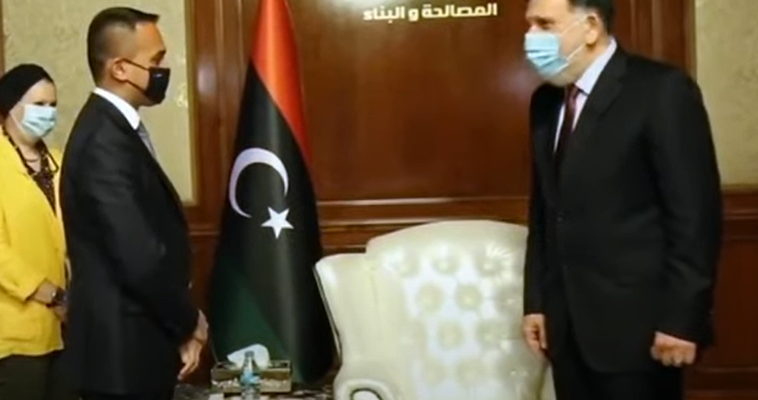Dimitris Deliolanis: Italy’s mid-step in Libya – What intelligence chief Caravelli said
06/07/2020
In late June, the Italian parliament’s secret services control committee, known as COPASIR, met in the presence of Gianni Caravelli, head of the Italian secret service AISE. Caravelli spoke to Italian lawmakers and senators about the situation in Libya. And his language was not diplomatic at all:
“Turkish intervention in Libya has significantly reduced Italy’s influence,” he said. “Today in Libya, Turkey is leading the dance, not Italy,” he said. “The situation for Italian interests is not rosy at all.” According to the head of Italian intelligence, there were only two positive news for Italy:
The first is that the headquarters of the US military for Africa Africom is not at all happy with Turkish rule in Libya. The tension, according to the AISE leader, was evident in one of the weekly meetings of the NATO headquarters, on the sidelines of which the problem was discussed. The Italian generals reiterated the traditional view that Turkey is a “strategically important ally”. Caravelli reaffirmed and presented arguments for the impression manifest after the visit of Africom leader General Steven Townsend and US Ambassador to Libya Richard Norland to Tripoli and their talks with the internationally recognized government there.
Sarraj wants the Italians
The second positive news for Italy is that Sarraj himself, who daily praises Erdogan as his “savior”, is in fact “not at all excited to see the Turkish flag fluttering on Libyan soil.” The solution, according to the Libyan prime minister and president of the Governing Council, is for Italy to become more involved in Libya, in order to balance the Turkish presence.
Foreign Minister Luigi Di Mayo himself, in his frantic and belated activism that made him visit almost all the capitals of the Mediterranean countries, visited Tripoli on June 25 and heard the request of the Libyan President directly from his mouth that Italy become more involved. This does not mean military involvement, as all Italian governments have so far ruled out any involvement in the country’s civil war.
The reason is that the hasty and unnecessary participation of the then Berlusconi government in the NATO bombings of 2011, which overthrew Qaddafi, still stings. Sarraj wants financial and diplomatic support and assistance in reconstruction. Italy, the only European country to have always kept its embassy open, has already donated 11 vessels to the Libyan Coast Guard to stop immigrant flows, while in 2016 the Italian Bersaglieri opened a military hospital in Misrata.
Promises and pleasantries
Following Di Mayo’s meeting with the Libyan prime minister, Italy has pledged to strictly control Libyan coasts so boats with refugees and migrants do not sail to Europe, an important document vis-a-vis Salvini’s anti-refugee rhetoric. In addition, the large projects undertaken by Italian contractors will be activated.
The major projects are the coastal highway and the two terminals of Tripoli International Airport. The projects worth a total of 80 million euros, should be completed within the next year. Di Mayo promised that a special team of the Italian army would undertake to neutralize the minefields that Haftar left behind during his retreat.
Finally, as soon as he returned home, the Italian Foreign Minister stated that he had received from the Libyan Prime Minister “assurances that, although the importance of the Turkish operation is particularly felt, Italy remains a fundamental partner for Tripoli, and is absolutely necessary and irreplaceable.”
The issue of the Muslim Brotherhood
Aside from diplomatic pleasantries, the issue is that, in relation to Libya’s political problem, Di Mayo carries in his portfolio a slogan that does no honor to his diplomatic associates. It is, however, the only thing that an awkward and inactive Italy (too anxious not to provoke the Turkish “beast”) has to show.
The Italian slogan says that there can be no military, but only a political solution and that Libya must remain a single country and not be divided between Tripoli and Cyrenaica. In other words, it is the old proposal to form a government of national unity that includes both Haftar and Sarraj.
A proposal that has not been made for six years because the Tripoli government is made up of Muslim Brotherhood leaders, an organization of political Islam that is now effectively controlled by Erdogan. Not only can Haftar not tolerate their presence in the governing coalition, but neither can neighboring Egypt tolerate its sworn enemies at its borders, namely the armed representatives of the government al-Sisi overthrew .
This is a tough puzzle to solve that can hardly be faced by a foreign minister like Di Mayo, who until recently could not find Libya on the map! However, it will be discussed at the Turkey-Russia-Italy tripartite committee at the level of senior Foreign Ministry officials, which should begin work in July.
The assassination of Giulio Regeni
Finally, we must mention an additional difficulty facing Italy on the Libyan front. The difficulty lies in the tragic case of Italian investigator Giulio Regeni, who was tortured to death by Egyptian security services in 2016 and his body was dumped on a highway. Regeni conducted his doctoral research for Cambridge University in Cairo on the trade union organization of street vendors.
Something happened which alerted the Egyptian political police, which may have considered him a British spy, an agitator, or something similar. The Italian secret service, which has located the ten agents of the Cairo security service responsible for the torture and murder of the young Italian, has not yet determined why he was suspected and arrested.
The point is that over the past four years, the Egyptian government has stubbornly refused to comment, and this has not helped Egypt’s public image in the eyes of the Italian public. The Italian government is well aware of this, as last month it was very difficult to explain the sale of two frigates to the Egyptian navy, at a time when Cairo does not seem at all willing to cooperate on the Regeni issue.





